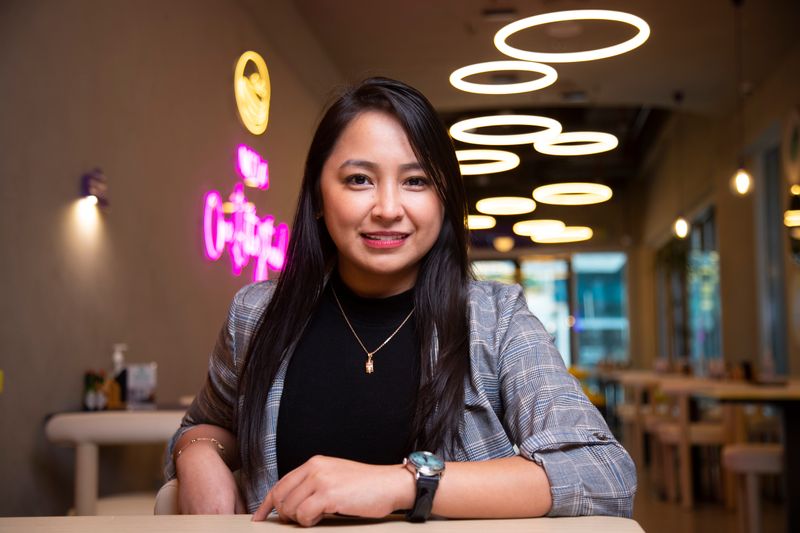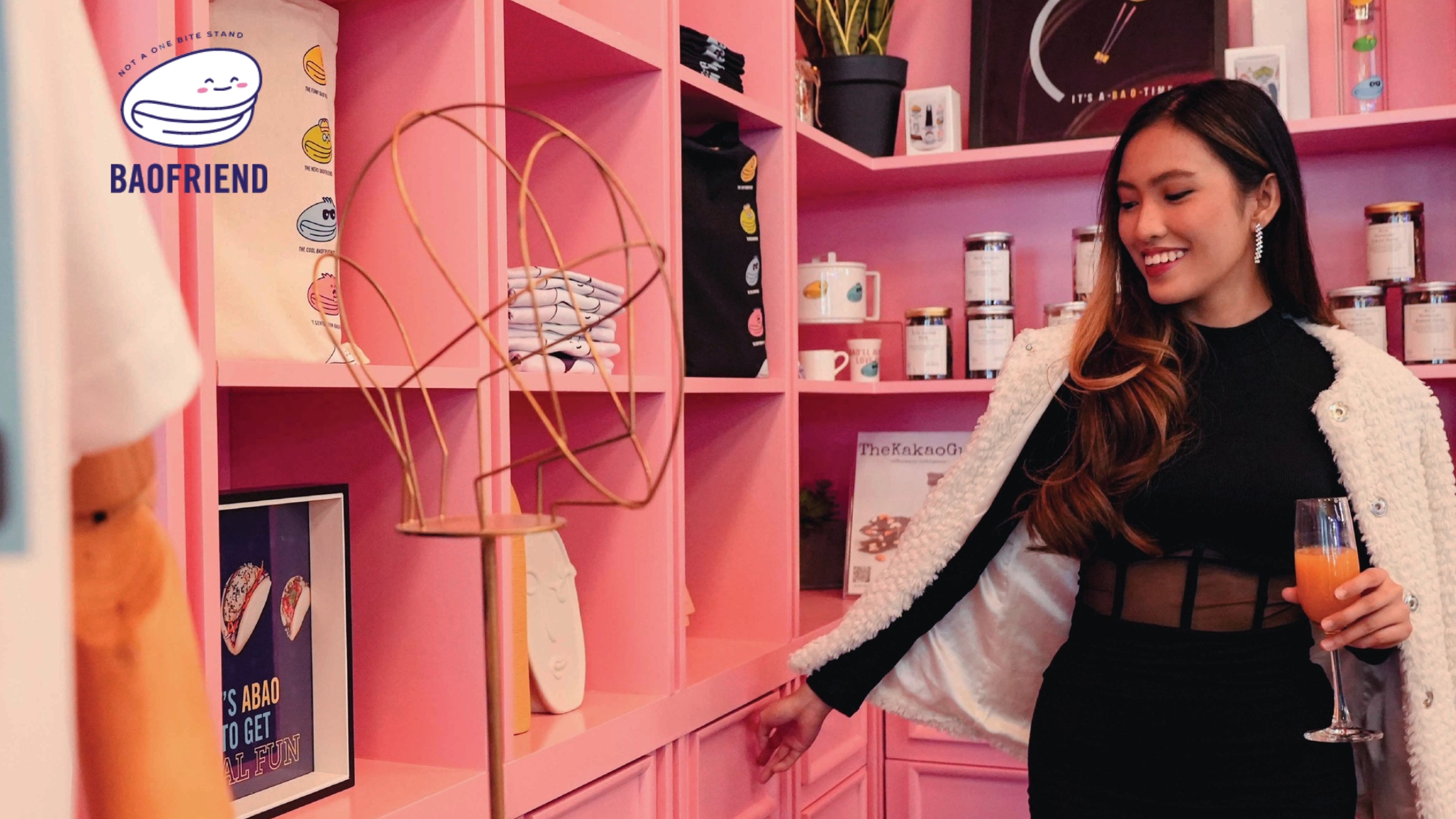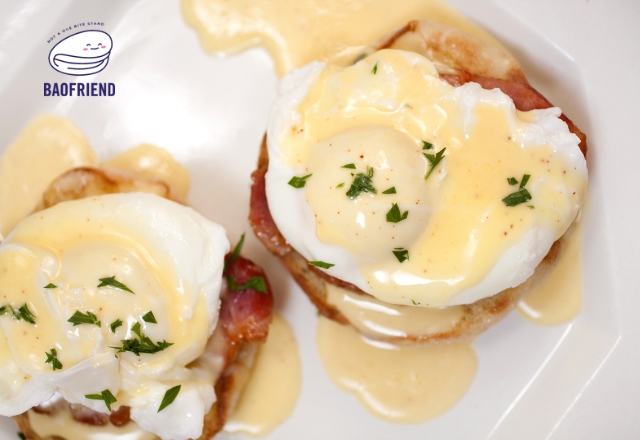Dubai: As a nine-year-old, when she would wake up at 4am on weekends to help mum run a diner in the Philippines, little did Junah Balungcas know that 26 years later, she would own a restaurant in Dubai.
The 36-year-old Filipina expatriate who recently opened her restaurant called Baofriend, specialising in bao recipes, told Gulf News: “My mum ran a small restaurant in a market in Molave, a small town set in a valley in the province of Zamboanga Del Sur, and my dad ran a meat shop. It was how we grew up. On Sundays, when there was no school, my brother and I would wake up at 3 or 4am and go with mum to help her before the restaurant opened for customers.
“A small restaurant, it could fit just about 20 people. At around 9am we would return home, bathe and head back to the diner to help with the customers. On school days, we would go to the market to help my mum until the restaurant closed, then we would help dad close the meat shop and return home together.”
Balungcas did not realise at that time that, inadvertently, this was training her for the future.
“I learnt from mum and dad, how to do business – how to communicate with people, how to sell your product. Sometimes, I would even do cashiering at the meat shop, or butcher or sell the meat,” she said.
However, she never had any formal training in hotel management or hospitality. In fact, at 25, Balungcas decided to move to the UAE to work in the healthcare industry as a nurse, as she had studied nursing.
From hospitals to hospitality
“I came to the UAE in 2011 as a nurse. Now, I am a nurse manager for two clinics – one in Al Ain and the other in Sharjah. So, my week is divided travelling between the two.”
Even with her busy work life, opening a restaurant was always one of her dreams. However, it wasn’t until a sudden craving for some comfort food on a winter evening in Dubai and the ensuing visit to an Asian restaurant that night that the dream transformed into reality.
Balungcas was finally about to take her first step into the food business in the UAE.
How a’bao some buns…
“It was December 2, 2021, at around 9pm I was sitting in an Asian restaurant. I had ordered a dish that reminded me of home – a bao, which is similar to a steamed dish we have in the Philippines, called the siopao,” she recalled excitedly.
It got her thinking about setting up a restaurant where not only would Asians enjoy Asian food, but also other nationalities. Balungcas decided to take the help of her Arab friends for ideas and invited them to try Asian cuisine.
“I decided that my restaurant would focus on bao buns and even offer bao dishes with a Middle Eastern twist. I wanted to make sure that the Asian fusion items that we would serve would be loved not just by Asians but by everyone“
“When they tried the food, I observed that the only thing they seemed to be truly enjoying were the bao sandwiches. And, I realised that despite there being thousands of restaurants to choose from, the one thing Dubai lacks is a restaurant that truly specialises in bao buns.”
Other Asian restaurants only seem to serve them as one of the items on the menu. However, there was so much more to bao buns, felt Balungcas, seeing a completely untapped food idea.
“This was it. I decided that my restaurant would focus on bao buns and even offer bao dishes with a Middle Eastern twist. I wanted to make sure that the Asian fusion items that we would serve would be loved not just by Asians but by everyone,” said Balungcas, very proud of the name she came up with for the restaurant – Baofriend, a pun on the word ‘boyfriend’.
With encouragement from her husband, her savings, and some financial help from her family and friends, Balungcas opened the restaurant of her dreams at the Dubai Digital Park in Dubai Silicon Oasis,
Today, the restaurant has a menu offering 19 bao dishes with different fillings. “You can opt for chicken, meat, vegetarian, and even desserts…, so that’s how massive the menu is,” she said.
So, what went behind setting up a whole restaurant in less than a year? For others who might dream of opening a restaurant in Dubai, Balungcas shared her experience.
Finding the right location
“When searching for a good location, we saw that Dubai Silicon Oasis (DSO) has around 90,000 residents. Aside from that, it has a digital park, which has many offices. So, the area is busy with office workers on weekdays. And, of course, the location meant we would be catering to the Dubai Silicon community as well. We found it to be the perfect location with very high potential.”
She also looked at the fact that DSO has a Free Zone Licence, which was more affordable. There was ample parking in the vicinity and other popular cafes nearby, ensuring visibility for her new restaurant.
Continuing to work full time
Balungcas was not ready to give up her medical career yet, so she found a team to help her. “My regular work hours are 8am to 5pm. So after five, I did not have much to do. I started using that time to think about the business and create strategies on how to run it.
“My first step was to find some help from professionals. We did not come up with a restaurant just in one click. There was a whole lot of planning behind the scenes,” she added.
Balungcas reached out to a restaurant consultant and started looking for experienced kitchen and waiting staff and a restaurant manager to supervise them. “So, it’s all teamwork for this restaurant to work,” she said.
Setting up costs
“The cost that you will incur in setting up a restaurant depends on the size of the restaurant, the kitchen, and other facilities,” said Balungcas. “For us, setting up the restaurant that’s around 2500 to 3000 square feet including the outdoor space, cost close to Dh2.5 million. However, this sum is excluding the consultant’s fees.
Hiring a consultant
“It was my first time building a business in Dubai. Moreover, Dubai is competitive when it comes to the Food and Beverage (F&B) industry – there are thousands of restaurants. So, your best bet would be to work with a consultant who knows the business and who can tell you what strategy is right or wrong, and how you can go about the business?”
The fees to hire a consultant or consulting agency are also quite high, which someone planning to open a restaurant should factor in, she said.
However, Balungcas said she was lucky that her family was able to help her arrange for the funds in time. She also feels that her spending behaviour also helped her to have some savings that she was able to invest into the business.
Saving tips
“I do manage to save a lot by not buying things that I think I don’t need, personally. So, I set aside my wants and only buy what is needed. Like, I don’t have to buy an expensive bag and pay an arm and a leg for it, when I can buy good quality bags with the same use, for much lesser. The practical use is the same. When you need comfortable shoes doesn’t mean you have to go to a luxury brand, there are plenty of reasonably priced brands that offer good quality shoes. So, in living a relatively simple way and avoiding splurging, helps me save some money for the business as well.”
However, when it comes to the restaurant, the Filipina expatriate is very careful to consult with the manager of her restaurant and the head chef in buying only the best, regardless of the cost, to ensure there is no compromise in the quality of the food delivered to the customer.
“For me, as someone starting a business for the first time, I needed help. I learnt that if you can get help, it would be better not to take the risk of doing it by yourself. Secondly, you have to make time for your business to be able to work and to be successful. Every day you learn something new – from something as basic as which tissue paper brand to buy, an expensive versus cheap brand to staffing issues or financials. You will learn to navigate such unavoidable issues as time passes. The learning process is faster if you take the help and advice of others who know the business very well.”
– Junah Balungcas
Operating costs
Once the restaurant is up and running, the next cost to factor in would be the operating cost.
“We also have many staff members in the kitchen and as waiting staff, and we are open from 7am to midnight. This means that we have huge costs in terms of the day-to-day running of the place as well.
“Monthly, if I calculate the salaries of the staff and all the other expenses like electricity, gas, and water and other employee benefits, I would say we spend around Dh150,000 to Dh200,000,” she said.
Breakeven timeline
Something that aspiring entrepreneurs don’t realise is the time it takes to break even. Many think that revenue will soon make up for the expenses. “There is incoming revenue; however, because we are new, it’s too early to see the profits. The revenue we do make, we use to cover the operating expenses. We are looking at one and a half years to two years to break even,” Balungcas added.
Challenges and lessons
She also shared some lessons she learnt on the way. “For me, as someone starting a business for the first time, I needed help. I learnt that if you can get help, it would be better not to take the risk of doing it by yourself. Secondly, you have to make time for your business to be able to work and to be successful.
“Every day you learn something new – from something as basic as which tissue paper brand to buy, an expensive versus cheap brand to staffing issues or financials. You will learn to navigate such unavoidable issues as time passes. The learning process is faster if you take the help and advice of others who know the business very well,” she said.
When starting a food business, how profitable is it to cater to a specific community? Balungcas feels that it depends on the popularity of the cuisine. However, she did not limit Baofriend to just one specific cuisine.

Balungcas’ restaurant focuses on bao recipes but their menu is influenced by international tastes.
She said: “Even if we are an Asian restaurant, we also cater to the Arab taste. We have menus that borrow flavours from other cultures, so our menu is influenced by international tastes. We included Korean items like noodles, and even some Chinese and Filipino dishes. One of our most popular dishes is the Katsu Baorger.”
The Filipina expatriate also added that Dubai is one of the best places to start a restaurant business because of the many cultures and how open people are to exploring new and unique cuisines.



